The life of Abai Kunanbayev, the greatest poet of Kazakhstan, has never been easy. But only very few could have predicted what the coronavirus pandemic would do in the year 2020, which had been declared the year of Abai Kunanbayev in Kazakhstan. Some of the 500 cultural events scheduled for this year had to be reorganized into an online format. But despite all the difficulties, the Poet’s 175th birthday was celebrated. It became a big event not only for Kazakhstan, but also for the whole world.
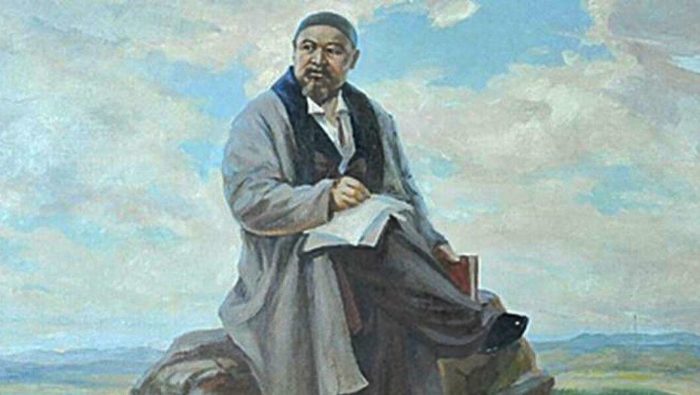
Nikolai Krutilnikov’s painting “Abai at work.”
The difficulties faced by the organizers of celebrations reflected the somewhat brooding character of the late Poet, who always objected to gluttony and laziness, praising hard work and self-reflection instead. There were few noisy banquets, but many lectures, online discussions and poetry recitals – which was very much in Kunanbayev’s style.
Until you learn, don’t teach others.
Until you wander in darkness,
Don’t say that you see the light.
Don’t look for senseless enjoyment
In the useless days and nights.
(Translation by Dmitry Babich)
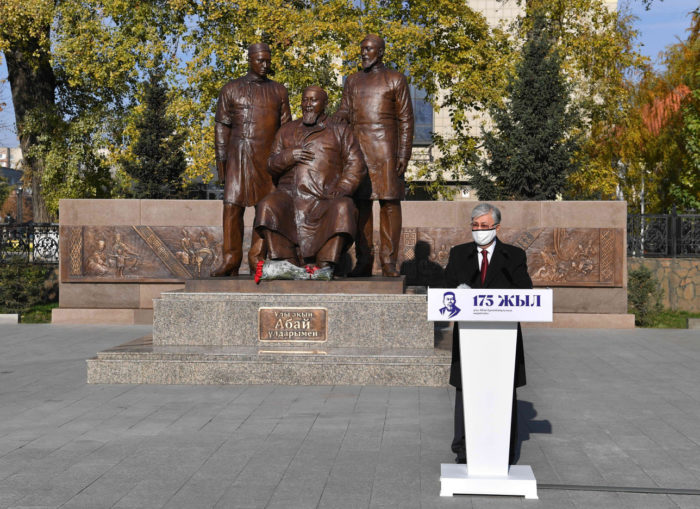
President Tokayev took part in the opening of the monument dedicated to Abai in Semei on Oct.15.
These verses, written by Abai in the 1880s, could become the slogan of this year’s celebrations, when a new online format suddenly destroyed distances and hierarchies. And again this was very much in the style of Abai’s poetry:
Learn from my bitter life story.
When thinking of your new friend,
Don’t ask “What is his position?”
But ponder on what he says.
(Translation by Dmitry Babich)
Despite Abai’s notorious indifference to state awards and hierarchy, one can say for sure that he would have been happy to see the way his countrymen celebrated his 175th birthday. Even more than the monuments and museums, devoted to him, he would have enjoyed the view of his native country. Who could have thought in 1904, when the Poet died, that his dearly loved land could be what it is now – an independent, prosperous country named Kazakhstan, a country aspiring to enter the club of the 30 most developed countries of the world by his bicentenary in 2045?
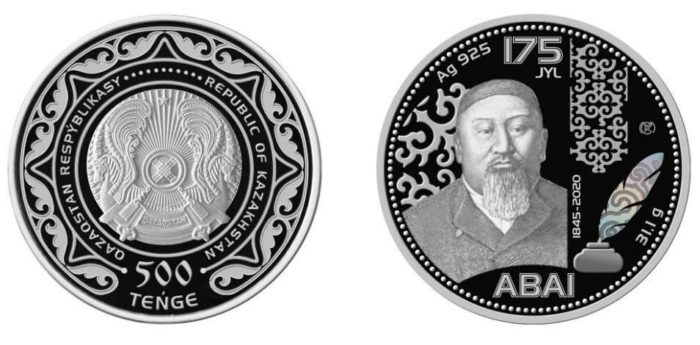
This year, the National Bank of Kazakhstan issued the special silver coins dedicated to Abai.
Who could have thought that this would be possible in 1945, at the time of Abai’s centenary (100th birthday)? The war against Nazi Germany just ended then and every third of the 1.2 million of Kazakhstan’s citizens, who went to fight in the Red Army, did not return home from World War II. Some villages had no men left alive, and only hope for future peace sustained the people! Who could have thought an independent prosperous Kazakhstan would be possible back in 1985, when Abai’s 140th birthday was modestly celebrated in the Soviet Union, with the USSR sliding into the Perestroika Crisis and the land of Abai still not able to fully decide its destiny? Who could have thought then, months before Nursultan Nazarbayev became the prime-minister of the still Soviet Kazakhstan, that in a few years time this sturdy “man from the land” would make Abai’s Kazakhstan the most successful republic on the territory of the former USSR? An independent country not only in law and form, but also in the minds of billions of people around the world?
Patience was one of the qualities that Abai cherished in people most, patience was second only to the desire to learn on his scale of values. So, with patience, Kazakhs made their Abai known to the whole world – as well as their own beautiful country.
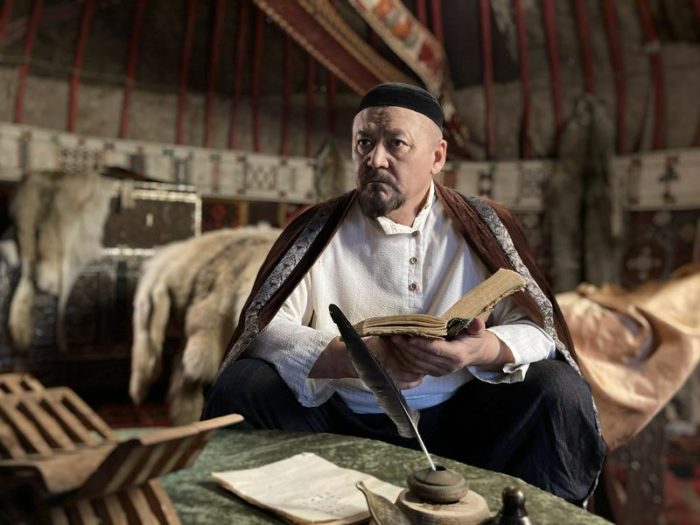
A scene from “Abai” historical TV series released by Qazaqstan TV Channel on Dec.16.
The year of Abai got off the ground in January 2020, with an article by Kazakh President Kassym-Jomart Tokayev. Titled “Abai and Kazakhstan in the Twenty-First Century” the article stressed the pedagogical value of Abai’s work. “Without destroying the lies and laziness inside yourself, you won’t achieve deep thoughts and rise to real science” – this was the quote from Abai that President Tokayev chose for his article, and one could not make a better choice. “Abai’s legacy should help us form a new nation,” President Tokayev wrote.
Yes, a new nation, a multiethnic entity with Kazakhs at its center, which would take all the best from Kazakhstan’s past and all best practices from other countries. This would be very much in Abai Kunanbayev’s vein. In his ‘Words of Instruction” he tirelessly called on Kazakhs to learn from other nations. To learn business from Sarts, to learn science and art from Russians, to see and imitate the warrior spirit of the Nogays and others.
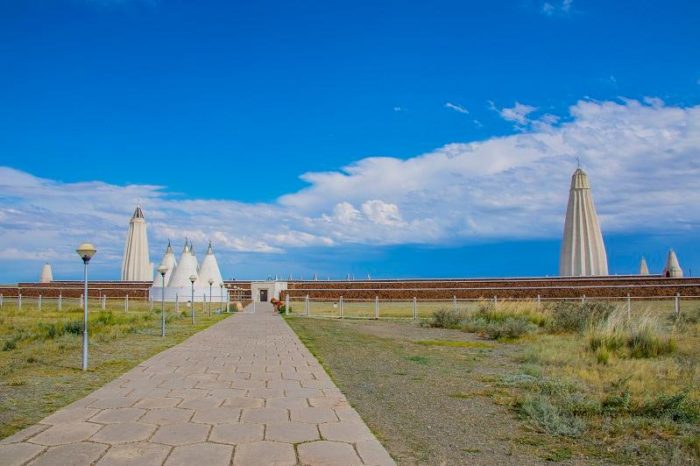
The birthplace of Abai is the Zhidebai district in the East Kazakhstan region. Photo credit: Kazinform.
Most likely, Abai would be happy today, if he read in today’s foreign newspapers that other countries, including Uzbekistan and Russia, are coming to Kazakhstan to learn: they are learning how to attract foreign direct investment (FDI), how to conduct a sound financial policy that would keep both industry and agriculture afloat, how to set up digital government, etc.
All of that would not be possible without Abai’s enlightenment of his people, which started in the 19th century.
There were hundreds of other events that took place in the framework of The Year of Abai, with $7.8 million spent on them. There was a super-modern flash-mob Abai Challenge and a traditional scientific conference that took place in Abai’s native Semey in August 2020, under the auspices of UNESCO. There were ceremonies of laying flowers at the monuments to Abai around the world, including Moscow, where Abai’s monument was erected next to Kazakhstan’s embassy. The initiative to open a monument in Moscow was made by Kazakhstan’s First President Nursultan Nazarbayev and Russian President Vladimir Putin in 2006. There were conferences of philologists (such as the online discussion “Abai and Pushkin” with Russian specialists on Abai) and an online project from Astana Opera House…
But still, the main monument to Abai is modern Kazakhstan, a hospitable country that scholars and laymen alike want to visit now. Abai’s family home was always full of guests, so he would understand us. But after every party he returned to his poetic works – translating Pushkin, Lermontov, Lafontaine…
“Don’t pride yourself until you have the knowledge. But when you have it, share it with others!” A nice bit of poetic advice for the Year of Abai from the poetic legacy of Abai himself.
The author is Dmitry Babich, a Moscow-based journalist with 30 years of experience of covering global politics, a frequent guest on BBC, Al Jazeera and RT.

